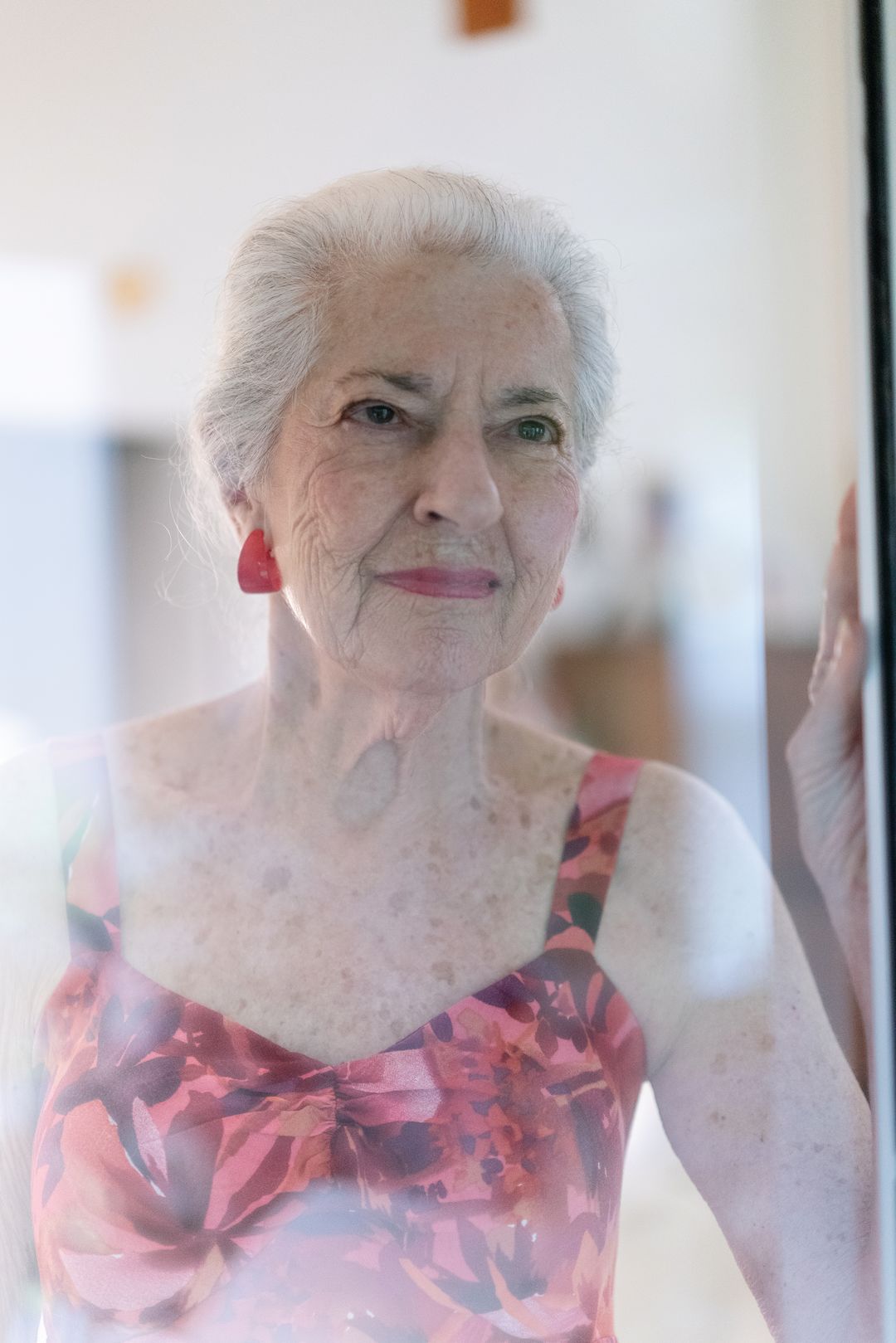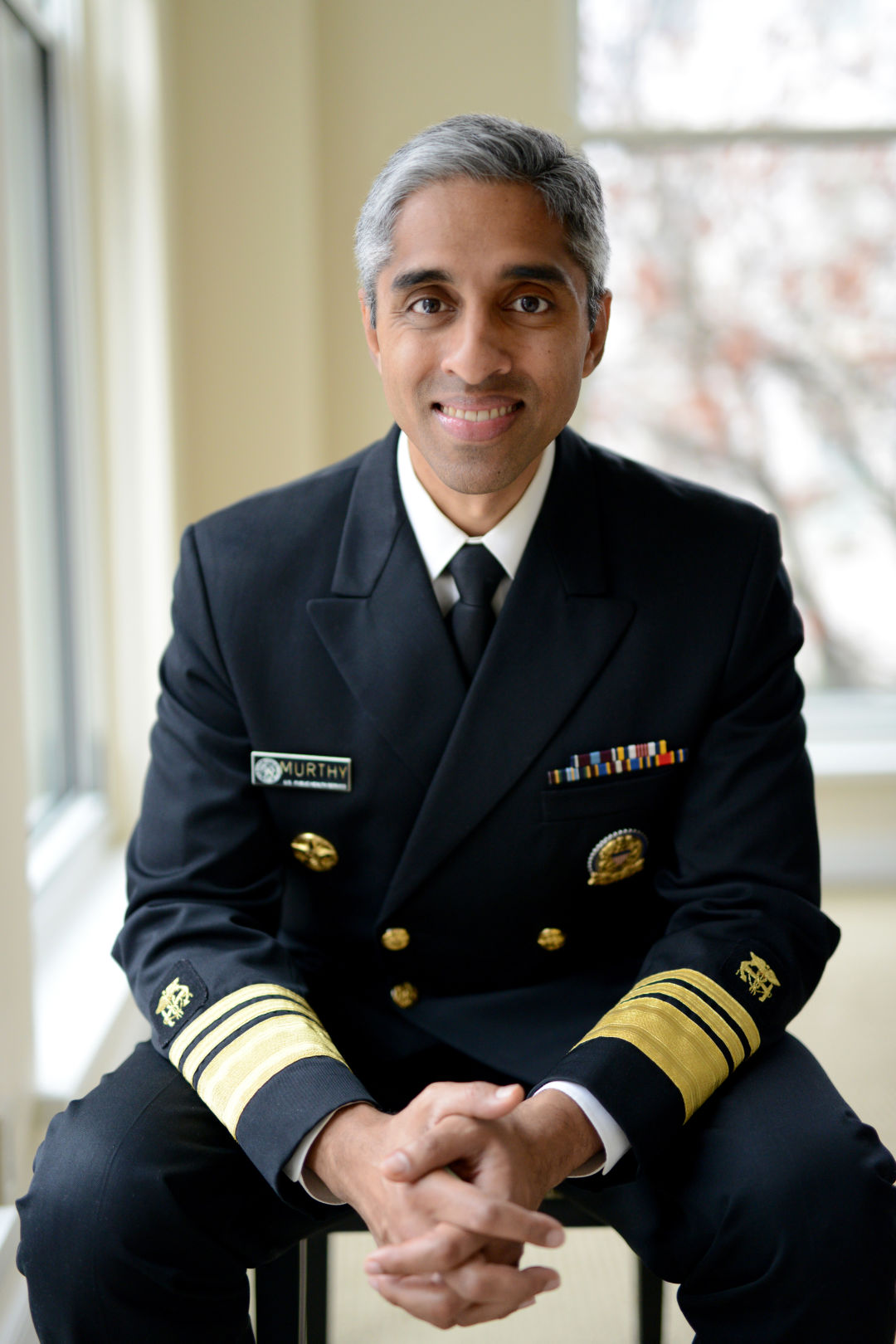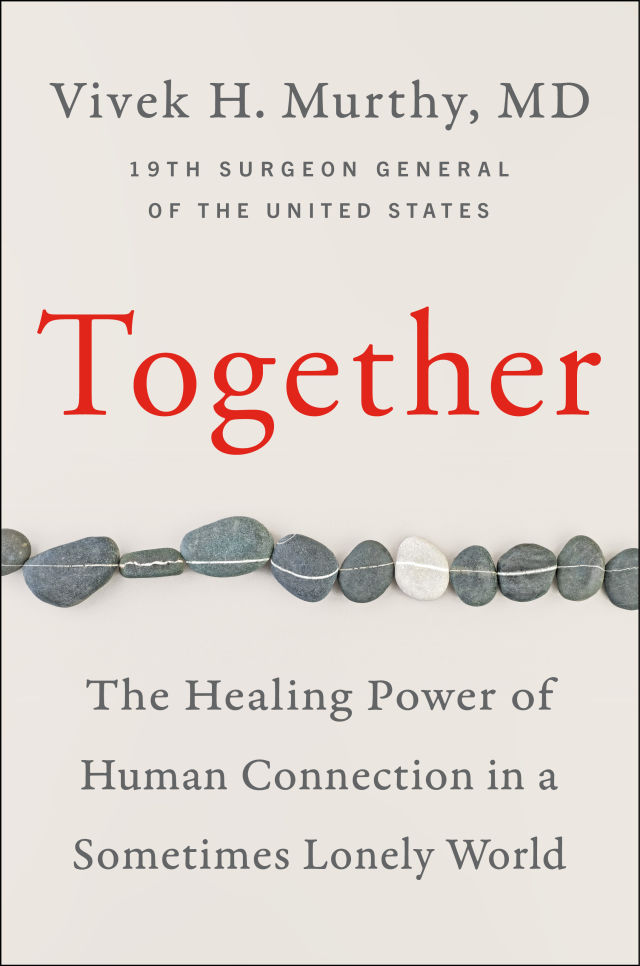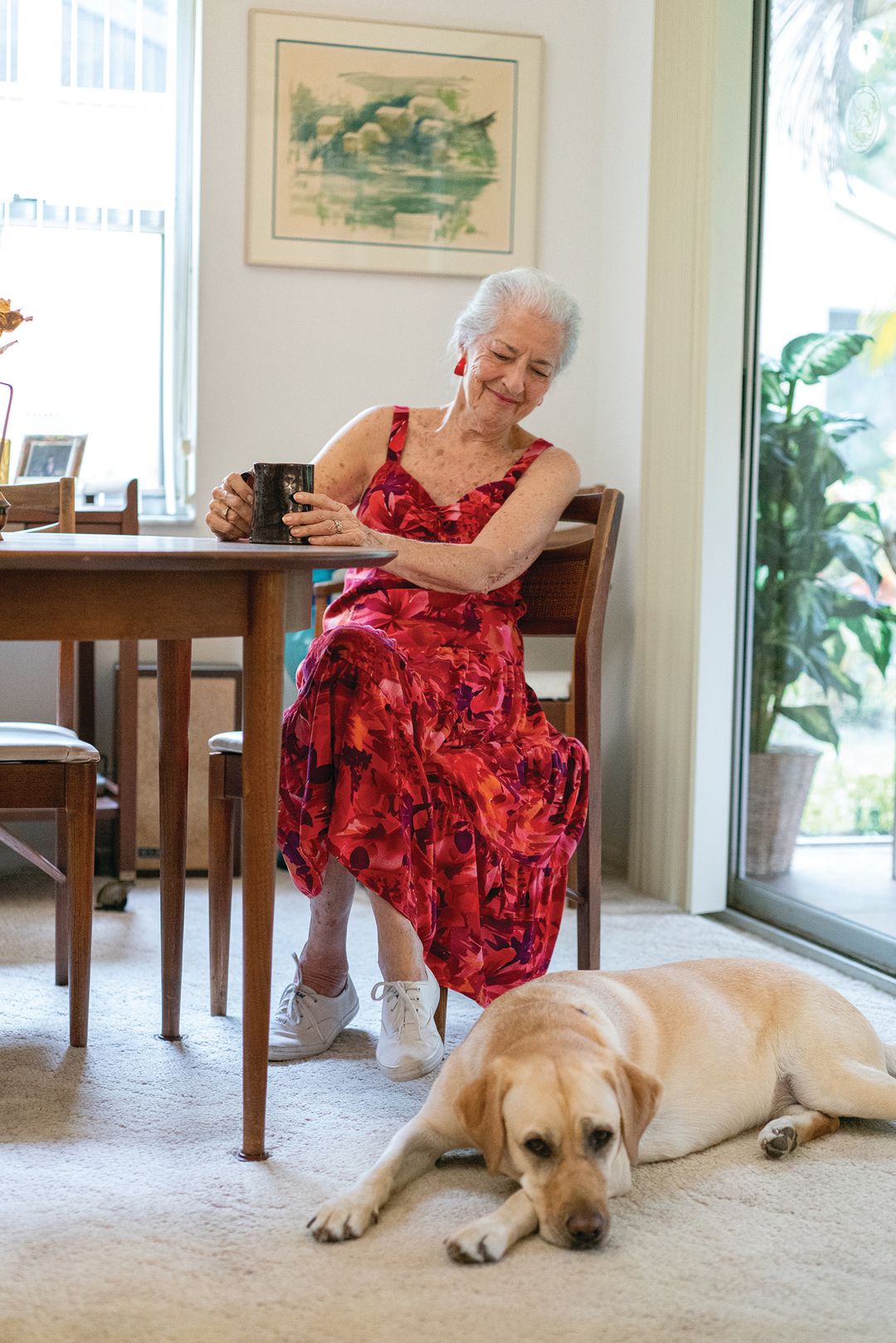
Covid-19 Is Fueling America’s Loneliness Epidemic
Erin McLeod, the president and chief executive officer of Sarasota’s Senior Friendship Centers, says most lives follow a similar pattern. From infancy to childhood to adulthood, your world expands, bubbling outward as you move through school and a career, make friends, fall in love, perhaps get married or raise kids. At a certain point, however, she says, “Your world starts to shrink.”
Perhaps retirement cuts you off from your colleagues. Your friends pass or your spouse dies. Your vision or your hearing deteriorates. You lose the ability to drive. You move into an assisted-living facility. Little by little, McLeod says, your world gets smaller.
For many of our area seniors, Covid-19 has accelerated that contraction.
Irene Herman, for example, is 85 years old. Before moving to Sarasota with her husband, Ken, in 1987, she worked as a radio news reporter and talk show host and served as a coordinator for the National Organization for Women. In Sarasota, she continued to work in radio and on television, wrote about the arts and performed one-woman shows singing pop tunes from the 1940s.
But around her 80th birthday, Herman found she couldn’t hear as well as she used to, and music began to sound distorted. That put an end to her singing gigs. In 2017, in the middle of the chaos and fear of Hurricane Irma, Ken suddenly died. Then, this spring, the coronavirus arrived, and even limited social contact became difficult and stressful.
Programs that had connected Herman to peers at the Senior Friendship Centers have been forced to move online. She hasn’t been able to see her daughter, who lives in Nokomis, as frequently as she likes, and she has no opportunities to run into old friends or make new acquaintances. And the looming uncertainty over when or how the coronavirus might go away is an ever-present source of anxiety.
“The not knowing is stressful,” Herman says. She sighs, then asks, “Do we ever get our life back?”
In one sense, at least, Herman is not alone. That’s because many population groups aside from the elderly are affected by the new isolation caused by the pandemic. And locally, several nonprofits are doing their best to help their clients and members cope.

Irene Herman.
Image: Chris Lake
Senior Friendship Centers opened in 1973 to bring aging residents together for meals and volunteer work. The nonprofit has expanded in the decades since and now offers health care services, social programming and recreation in centers in Sarasota, Charlotte, Lee and Collier counties. McLeod says that while the pandemic has left many feeling stranded and alone, “it really has impacted older adults worse than anyone.”
According to McLeod, seniors who lose social interaction begin to move less, sit more and eat worse, all of which can cause poor health. And while other people have compensated for not being able to get together by organizing Zoom happy hours or FaceTiming with friends, seniors may not feel as comfortable with their computer or smartphone.
Recognizing the crisis, McLeod and others at the Friendship Centers created a master list of all the organizations’ clients and began making phone calls and mailing letters to check in with them. Volunteers have also begun delivering groceries or dropping off meals for home-bound seniors, and the nonprofit has begun offering some of its programming online.
Other local nonprofits are also trying to reach those who are isolated. Tidewell Hospice is using Zoom to host support groups for people grieving after losing family members. Meals on Wheels of Sarasota and Meals on Wheels PLUS of Manatee, meanwhile, have both seen major spikes in need. In addition to dropping off meals for hungry locals, Meals on Wheels volunteer drivers are trained to check the safety and cleanliness of clients’ homes, which helps them identify people who might need help.
Other specific subsets of our population are more likely to suffer from isolation, as well.
ALSO Youth, a nonprofit that provides programming and support for LGBTQ youth, was founded in 1992 by a team of people alarmed by the high suicide rate among gay and lesbian teens. In normal times, the organization operates a drop-in hangout space in the Rosemary District where young people can find supportive peers.
ALSO executive director James Robinson estimates that, before the pandemic, 75 or so kids would visit ALSO’s youth center each month. Because of Covid-19, ALSO’s youth center has been closed since spring.
“The tendency among some LGBTQ youth is to isolate anyway, and it’s exaggerated more during this time,” Robinson says. He says peer groups like those at ALSO are “critical” in giving LGBTQ youth “a sense that they’re not alone.”
ALSO is currently offering virtual support groups, but the attendance is half what it was when the sessions were held in person. Robinson says LGBTQ youth may lack access to the Internet or a computer, or they may be keeping their sexual orientation hidden at home and don’t have the privacy to dial into ALSO’s virtual discussions. “There are myriad obstacles they could be confronting,” Robinson says.
People with substance abuse problems are also at increased risk because of isolation. Experts have warned that social distancing has cut off people struggling to remain sober from support groups. At the same time, some treatment centers have limited their services, and uncertainty over one’s health and job is running high.
Since the beginning of the pandemic, the number of drug overdoses around the country has risen rapidly. In Sarasota County between March and July, 95 people overdosed on opiates, a 228 percent increase over the same period last year, and 22 people died from an opiate overdose, compared to just four during the same time period in 2019.
First Step, a nonprofit that offers a variety of drug and alcohol addiction recovery programs, has instituted several changes to help those struggling with substance abuse. The organization is still housing clients but has banned visitors and has expanded its telehealth services for people who can be helped over the phone. Virtual support groups can help those struggling with substance abuse, but it can be more difficult for people to open up, and not everyone has access to high-speed Internet.
Indeed, not everyone can be reached. McLeod says Friendship Centers employees and volunteers have been in contact with many of the people who used to come into the Centers, but many remain out of touch. Have those people temporarily moved in with family? Are they suffering from Covid-19? Or is their voice mailbox just full and can’t accept new messages? McLeod doesn’t know. But those at the Friendship Centers continue to try to reach them.
“We acknowledge that isolation sometimes can’t be helped,” she says, “but people don’t have to be lonely.”

Former U.S. Surgeon General Dr. Vivek Murthy.
Image: Meredith Nierman
This is all taking place against a national and even global backdrop. We’re in the middle of what Dr. Vivek Murthy, who served as the U.S. surgeon general from 2014 to 2017, and his wife, Dr. Alice Chen, called in a March article a “social recession,” a “fraying of social bonds” that is “marked by growing loneliness and isolation.”

The cover of Dr. Vivek Murthy's Together: The Healing Power of Human Connection in a Sometimes Lonely World.
Image: Courtesy Photo
Even before the pandemic, Murthy was convinced that loneliness in America is a public health crisis. His book, Together: The Healing Power of Human Connection in a Sometimes Lonely World, was published in April. It had to be held up at the last minute so Murthy could add a new preface touching on the coronavirus pandemic.
“We were already dealing with a deep well of loneliness before Covid-19 arrived, and my concern was that the distancing that we would be forced to observe would separate us even further,” Murthy says. “It was cutting us off from other people exactly at the time when we needed people more than ever.”
Murthy cites a 2018 report from the Henry J. Kaiser Family Foundation that found that 22 percent of American adults say they “often or always feel lonely or socially isolated.” As Murthy points out, that means 55 million Americans struggle with loneliness.
Evidence of increasing loneliness and isolation is all around us. For starters, the percentage of Americans living by themselves more than doubled between 1960 and 2018. More than a quarter of Americans (28 percent) now live alone.
At the same time, Americans have become less likely to join groups. In the mid-1940s, 76 percent of Americans were members of a church, synagogue or mosque, according to Gallup survey data. That number hit an all-time low of 50 percent in 2018. Today, fewer than half of Americans attend religious services at least once a month, according to the Pew Research Center.
Nonreligious groups have also splintered. In 1983, 20.1 percent of workers belonged to a union. That number had fallen to 10.3 percent by 2019. When compared to past generations, Americans today are more likely to live in gated communities and less likely to socialize with neighbors, use public transportation and visit public recreation facilities.
Loneliness and isolation don’t just make people feel sad. They have major public health consequences. One 2010 study found that lacking “adequate social relationships” is a mortality risk factor on par with obesity or physical inactivity. Researchers found that developing quality relationships does as much to improve your health as quitting smoking.
Over the past two decades, technology has radically altered how we connect with others, and the results of those changes are not yet clear, Murthy says. Social media makes it easier to keep in touch with distant friends, for example, but it also causes users to constantly compare themselves to others—often negatively.
“When you see pictures of people having a great time with their friends and celebrating birthday parties and sharing news about job promotions, it’s easy to feel that you’re not measuring up and that your life isn’t good, by comparison,” Murthy says. “I worry about this especially for young people, whose identities are still being shaped.”

Irene Herman and her companion dog, Butter.
Image: Chris Lake
Even before moving to Sarasota, Irene had already lived a full life. Still, adjusting to the loss of her hearing and her husband’s death were challenges. She struggled to connect. “It was one of the hardest adjustments I’ve ever had to make,” Herman says. “There was a huge, huge void in my life.”
Herman began participating in a Tuesday discussion group at the Friendship Centers called Aging Rebels, sang with a group called the Pine Tones at the Pines of Sarasota and volunteered with the Hearing Loss Association of America and the Jewish Federation of Sarasota-Manatee.
But then the pandemic hit, and all of that has been put on hold or has moved online. Fortunately, Herman’s connections with local groups prior to Covid-19 have helped her cope. At a Hearing Loss Association expo, she met representatives from Canine Companions for Independence. Last year, she was matched with a yellow Labrador named Butterfly the Third. “Her friends all call her Butter,” Herman says. Butter notifies Herman when her phone rings and, if the smoke alarm goes off, is trained to alert her.
Periodically, Irene also stays with her daughter, Cara, and her husband, who make sure Irene’s home is stocked with groceries and other necessities.
“She’s my best friend,” Cara says of her mother. “It hasn’t been any kind of hardship for us to do the extra grocery shopping.” But she can tell that Irene is frustrated and lonely. “She’s always been such a social person and such an active person,” Cara says.
“You just don’t see people!” Irene exclaims. “It would be nice to go up to my friends and give them a hug. You miss the social and the physical contact.”
Murthy says the pandemic is forcing many Americans, including him, to take stock of their lives and reevaluate their priorities. “This pandemic is an opportunity for us to do a reset,” he says. “It’s a chance for us to double down on our commitment to our relationships and to ask how we can put people first.”
That could mean prioritizing the people in our lives over our careers or supporting public policies that build what Murthy calls a “people-centered society.” He says people are “hungry” for compassion, kindness and mutual respect.
“So many people across the country and, frankly, across the world are deeply concerned about the fact that we seem to care less about each other,” Murthy says. “We seem to find it easier and easier to treat each other more and more poorly.” Murthy hopes that when we do emerge from the pandemic, we will have learned some valuable lessons.
For now, most of us are just getting by. After Ken died, Herman joined a bereavement group and began using the mantra, “This, too, shall pass.” She’s using that mantra again these days, as well as another one: “Just for now.”
“Just for now, I can do this,” she says. “I don’t want to project it into the unknown future, but I can handle this, just for now.”